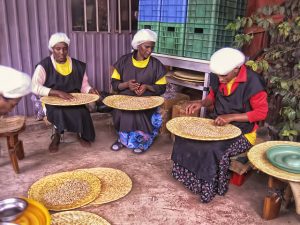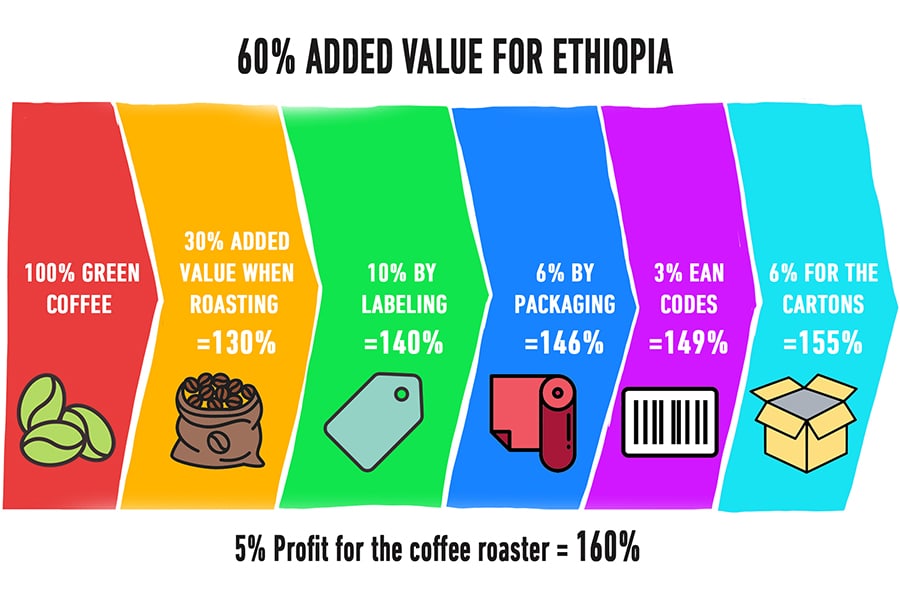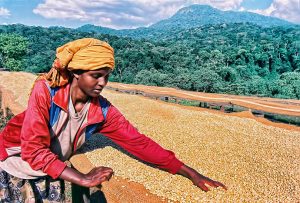Solino Coffee FAQ
Each coffee is different: for example, there is Robusta and Arabica coffee. What is special about the Solino coffee project? How much are people paid and where do the coffee beans grow? How fresh is the coffee and how much caffeine contains our Espresso and Caffè Crema? Here you find answers to your questions. If you have additional questions, please contact us!
- Processing at the origin. Solino is processed at the origin in Ethiopia. Roasting and packing at the origin helps Ethiopians to receive more money for their coffee (approximately 60% more compared to green coffee export). As the processing requires qualified jobs (roast-masters, printing experts), Solino pays 3-10 times higher than average salaries: 60 – 300 Euro / month compared to a salary of a coffee farmer which is 30 Euro / month. The Greenpeace Magazine has described Solino as “Fairtrade – Plus”. Actually, only in 2008 the European Union stopped the 30% custom duty on roasted coffee for the most underdeveloped countries (ACP – countries). Green coffee was always imported tax free. In this way, Germany became one of the biggest exporter of coffee in the World.
- Sundried Coffee. We only use sundried coffee. Compared to the washed coffee, the sundried coffee is usually a bit less acid and has a more earthy taste (please see also question 11).
- More value and more qualified better paid jobs for Ethiopians. This means, the country reduces
its dependency on exporting only raw materials and farming. - Less traders and wholesalers between coffee farmers, roasters and consumers.
- Direct access to freshly harvested green coffee at the origin (it is also important that the green coffee is fresh).
- Lower labour cost in Ethiopia, even when the salaries paid are significantly above the country average.
- Time of transport after roasting. The transport from Addis Ababa via Djibouti to Hamburg takes about 21 days per seafreight. From our experience, this is not a significant problem.
- Training and organisation in Ethiopia. Producing a final product which can be delivered directly from Ethiopia to European supermarkets requires a lot of attention to details. Perfect printing quality with readable EAN Codes, constant quality of roasting, perfect quality of packaging including outer boxes.
- Frequent electricity cut-offs even in the capital of Addis Ababa. This leads sometimes to delivery delays and out of stocks.
- Less processing for the coffee industry in Europe.
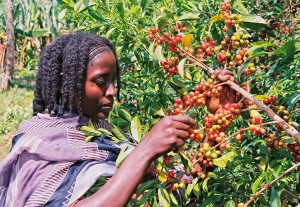
The most famous areas of coffee plantation are located in the regions of Yirgacheffe, Ilubabor, Jimma, Sidamo and Harar.
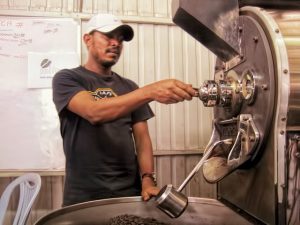
sufficient amounts in a reliable way. In this way additional roast-masters, printers and other
employees were trained and employed, earning better paid salaries.
Our roast-masters were rewarded by two international certifications for their quality work: Here you find the certificates from USAID and BONCAFE:
Ethiopian coffee farmers usually do not use any fertilizers, also because they could not even afford it. To receive an organic certificate from the EU, farmers would need to pay around 6000 €. These fees must be paid for consultants and auditors from Western countries. However, the goal of Solino is to ensure that more value stays in Ethiopia. Therefore we consciously abstain from obtaining an organic certificate.
Fairtrade programs have the goal to give more money to coffee farmers. Similar to organic certifications, it is also expensive to receive fairtrade certifications (approx. 5000 € when we checked last time). Fairtrade certifications are mostly given by certification agencies, usually from Europen countries. With Solino we want to ensure that Ethiopians receive the maximum for their coffee. We focus on the roasting and packing in Ethiopia. With every kilo of roasted coffee, the country earns 60% more when compared to the export of raw green coffee. The value addition process requires qualified jobs. For example, coffee roasters and printers earn around 3 – 10 times more compared to the average salary of a coffee farmer. The German Greenpeace Magazine describes Solino as “coffee fair plus”.
There are 2 main reasons:
- Generally the Ethiopian Arabica coffee is one of the most expensive Arabicas in the World. Probably because the coffee growth at a very high altitude above 2000 Meter and each coffee tree carries much less coffee berries than in other countries. However, the taste of the berries grown in high altitude is more intense.
- Solino Coffee is a handroasted coffee. Each roast batch contains only 15 – 30kg and the roast time is very long. 20 minutes for Caffè Crema and 23 minutes for Espresso at only 210 °C. In addition we need 12 minutes to cool the coffee beans. This process is much more work intensive compared to an industrial coffee roast which takes only 90 seconds at a temperature of up to 600 °C .
When compared to other hand roasted coffees from Europe, Solino is relatively inexpensive. Also for this there are 2 reasons:
- As we buy and roast our coffee directly in Ethiopa, we do not need any wholesalers, importers or traders. Even large scale roasters usually buy from coffee traders, not directly from the Ethiopian Coffee Exchange in Addis Ababa.
- The work intensive handroasting is cheaper in Ethiopia, even though we pay above average salaries (see also question 6 above).
Our roasters buy the green coffee direct at the Ethiopian Coffee Exchange in Addis Ababa (www.ecx.com.et). We always buy from the areas of Illubabor and Jimma. The Ethiopian Coffee Exchange was founded only few years ago. The goal is to create a more transparent exchange and transparent prices, to eliminate the coffee traders and ensure that more money is received by the coffee farmers. Coffee farmers who sell on this official exchange are controlled by the government and must comply with the local work law (no child labour). Since August 2017 we are also buying our coffee directly from coffee farmers which we know personally. By the Ethiopian law, this is only possible since mid 2017. The first farm where we bought directly coffee is in Southern Ethiopia in Jimma. We have visited this farm already in January 2017 (link to the video). Here you can find a description of the different Ethiopian coffee qualities: PDF link
Certainly the taste! Arabica coffee is much more intensive and has a larger variety of flavours. Ethiopia only grows Arabica coffee. It grows in the highlands at an altitude of above 2000 Meters. As Arabica trees carry much less coffee berries than Robusta trees, it is around 2-3 times more expensive.
There are 2 ways to treat coffee after the harvest: Sundried coffee is dried in the sun and the seed of the coffee berry is separated from the fruit during this drying process. Washed coffees are mostly used for exports.
Usually, sundried coffees have a stronger more earthy and sweet taste. The traditional process of sundrying also uses less water and is more environmental friendly. Therefore we prefer to use sundried coffee.
There are big taste differences of coffees. The kind of coffee tree, the climate, the temperature, the soil, the processing after the harvest and the roasting all influence the coffee taste. Usually we differentiate between 4 different criteria:
- Acidity: Generally one can say that a darker roast level contains less acidity. Some aciditiy is however very important for a balanced taste. Too much acidity is, on the other hand, a sign of high temperature roasting for a short time. Therefore we roast our Solino Coffee for 18-21 minutes at a temperature of only 210 degrees. During the long roast, the flavour can fully develop and the unwanted acidity that derives from tannin is eliminated. Usually, the sundried coffee used by Solino also contains less acidity compared to a washed coffee.
- Body: This describes the “mouth-feel” of the coffee. A full, creamy and round taste is desired. We try to obtain this also because we use sundried coffee.
- Flavour: As for wine, coffee has also an endless amount of different flavours. In addition to the typical taste of coffee, these are chocolate, berry, citrus and spice. A maximum of flavours means usually the best possible taste.
- Smell: A good smell is also very important. It depends as well from the kind of coffee and the roasting process. The fresher the coffee (not only the roasting, but also the green coffee bean) the better the smell.
Here you will find a taste description of all Ethiopian coffees.
Coffee roasters are using the “Agtron Colour Table” (Link to the Website of Agtron), to define the level of roast. Dark roasted coffee has a stronger taste and has less acidity. In Ethiopia (just like in South of Italy), people usually prefer dark roasted coffee with an intense taste. Light roasted coffee has a less strong taste, but it is easier to distinguish the different flavours. It also contains a bit more fruit acidity. Solino Espresso (Agtron 35-40) and Solino Caffè Crema (Agtron 40-45) are slightly darker roasted compared to an average roast level in Europe.
Solino is made only from Arabica coffee beans. Arabica contains generally less coffein compared to Robusta coffee. Also the darker roast of Solino reduces the amount of coffein compared to lighter roasted coffee. The longer coffee is roasted and the darker the colour is, the less it contains coffein. Also the Solino Caffè Crema is roasted darker than normal filter coffee. Therefore it contains relatively little coffein.
We buy our coffee always from the same areas of Illubabor and Jimma. The beans are not always exactly the same from one harvest to the next. Our roast masters in Addis Ababa are adapting the roast level to each harvest in order to achieve the best possible taste result. This means, that colour and also taste can vary a bit. In addition, all our coffees are roasted by hand. Such a hand roast can never be compared to a fully standardized industrial roast.
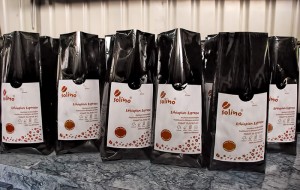
Protected from oxygen, light and humidity, our coffee can stay fresh for 20 months. After the opening at home, please keep the coffee in the original pack and close it well. The biggest “enemies” of roasted coffee are oxygen, high temperature, light and humidity.
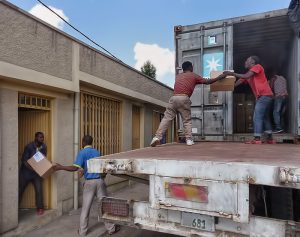
As we order every 6 weeks, the coffee shall not be older than 10 weeks after roasting when it arrives at your home. This amount of time is not a problem if the coffee is well packed and stored.

